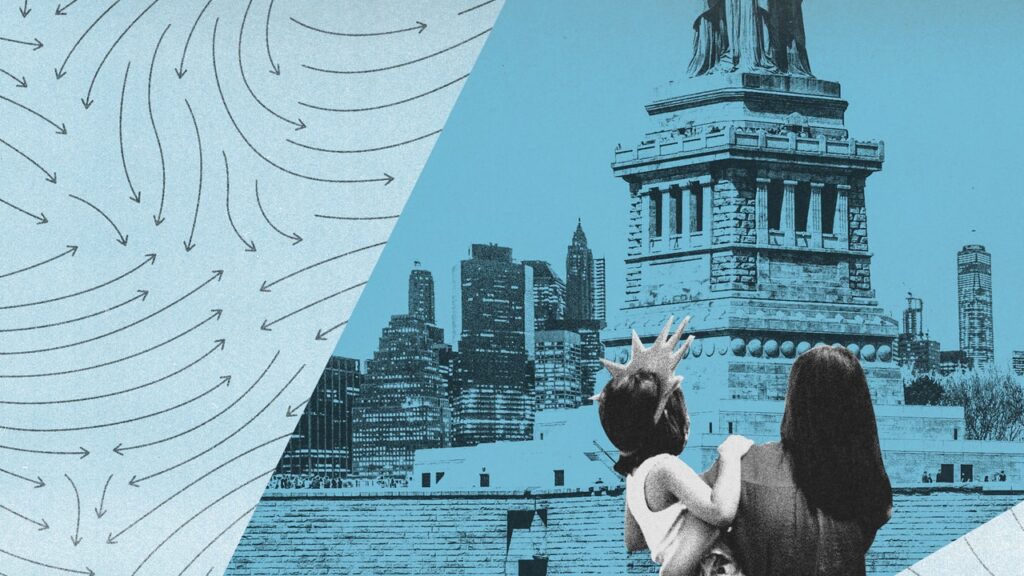Manuela, who has a two-year-old named Nicole, wore jeans and a long-sleeved shirt and spoke in Spanish; her mother and father stood beside her in traditional clothing and spoke in Kichwa. Manuela’s parents were born in Guaylla Grande, as were her grandparents and her great-grandparents, along with everyone else in her family tree for as long as anyone could remember. When Manuela was around ten years old, her parents had decided to move the family to Alausí, the district seat, in a humid valley an hour down the mountain, so that she and her siblings could attend secondary school. (Countless other families have left their ancestral villages in recent years for the same reason, including Doña Elvira’s, who moved to Colta from a similarly remote community when María and Mercedes were young.)
Manuela’s maternal grandparents followed them to Alausí. But then tragedy struck. On March 26, 2023, after months of heavy rain, a landslide swept away their home, destroying all their possessions and killing Manuela’s grandparents. A year later, the family was penniless and desperate, renting a small house in town that they could not afford.
A few of Manuela’s cousins were, like her husband, already in New York, and she followed them on social media. I’d come to know one of her relatives living in Queens, who sold candy and soft drinks on the subway—a gruelling way of life that is rarely highlighted on TikTok. To Manuela and her husband, migrating to New York had seemed like the only decent option that remained. “If God allows me to get there safely, I hope I might find a job, rent a place with my husband, and be able to send some money back to help my family,” she said, crying. “And then, eventually, I’ll come back to Ecuador.”
We stood in silence in the cemetery for a few minutes. Manuela and her youngest sister picked yellow wildflowers and placed them on the tombstones. Manuela’s mother sat on the ground nearby, and her father paced a bit farther away. I imagined the funeral procession that had arrived here more than two months after the landslide, when the bodies of Manuela’s grandparents were finally pulled from the rubble—the family moving slowly up the mountain, first by car to Guaylla Grande and then silently on foot to this cliff above the clouds. The wind made an eerie noise as it rustled through the graveyard grass. Later, I learned that there was a saying in Kichwa for that sound. Wayra wakashpa rishpa, shamun y rin. The wind, crying, comes and goes.
Returning along the road that led to the cemetery, we stopped in front of a cluster of homes. Manuela’s mother, Olimpia, called out in Kichwa. A few moments later, a very old man hobbled out of one of the houses and offered me a hard and scratchy hand. His voice was feeble and high-pitched, and he spoke with whistles through the spaces in his teeth.
Before I’d left New York, one of Manuela’s cousins in the city, Aidita, asked me to visit her paternal grandfather, who was still alive. This was him. His name was Jesús. “This is a friend of Aidita’s in the United States,” Olimpia told Jesús. “He came to visit my parents’ tomb and to meet you.”
“Ah, qué bonito.” Jesús didn’t say much more than that—“how nice”—in our short conversation. I told him that I knew his granddaughter and great-grandchildren in New York. Because Guaylla Grande is a place where cell signals don’t reach reliably, I asked him if he wanted to send them a voice message. He said yes. I held my phone out and pressed Record.
“Aidita, your grandmother is very sick,” he said into the phone. “We’re fucked here. I’m just by myself.” He paused, waiting for a response.
“Say, ‘We’re fine,’ ” Olimpia whispered to him while I tried to explain that we were making a recording, not a phone call.
But Jesús had nothing more to say. “Thank you, Aidita, for sending the visitor,” he finished.
María, October 9, 2024
Song: Solmary Tixi, “Mi Valiente Migrante”
[Photograph: María holding her daughter Ale and smiling on a sunny day in Times Square]
Lyrics: “To leave home means to leave with your feet but never with your heart. For my family, for my mom, for my siblings, I find myself far away, working day and night. . . . A call or a message is not the same. . . . Don’t cry. Don’t cry.”
Fall turned to winter, and things were not getting easier for María. “It’s all work, all the time,” she told me when we met up one weekday evening in early October, in Parque de los Niños. The sun was setting, and she was shivering in a light zip-up jacket. She was exhausted from another day on the job, her hands covered in blisters. “I’m learning how to do the packaging for the cookies, and it’s really hard,” she said. “But I got a cleaning shift at the factory on Saturdays, so now I’m working then as well.”
Saturday used to be María’s time to relax—it was the only day she could go out and have fun with baby Ale. Sunday was filled with laundry and errands. She and Ale had been happiest on Saturdays, when they would go with Mercedes and her children to the park and record TikTok videos of themselves dancing. “The videos are for anyone who wants to watch,” María told me, when I asked her if her posts were meant for anyone in particular. “But mostly I make them to have fun and make myself feel better. It takes away some of the stress of what I’m going through.”
Her husband still hadn’t found regular work, and some months she had to take on his share of the rent. Too often, she felt completely alone in this challenging new life. It didn’t help that the people around María seemed to have it all together. Her friends at work asked why she didn’t buy more clothes, why she didn’t paint her nails. “They say, ‘You’re in America now,’ ” she told me. It felt to her like only she and Mercedes were struggling. “I tell my parents, ‘I’m O.K., I’m O.K.,’ but the truth is I’m not.” María wiped tears from her eyes. “I have debt with two different banks. And everything I make goes to pay rent and debt. Rent, debt. Rent, debt.” She opened her jacket to show me a white T-shirt underneath that read “New York,” in black script. “This is the only thing I’ve bought since I got here,” she said. “Everything else”—she pointed at her jacket, her leggings, the baby stroller that had replaced her shawl—“is donated.”
Nearly all the Ecuadorian migrants I spoke to lived with the shame of feeling that they were sinking, but they didn’t communicate this to one another, either because they didn’t want their relatives to worry or because they didn’t want it to seem like they had failed. The few migrants whom I’ve seen share a pessimistic post tend to do so at a distance, as part of a smaller trend of TikTok videos that claim to present “the truth about life here in the United States” in more general terms, usually without much detail about the creators’ personal situations. In one video, which has received more than four hundred thousand views, a TikTok comedian named Tío Ainy, who satirizes the Indigenous Ecuadorian migrant experience in New York, wanders through the streets of Corona, searching unsuccessfully for a meal that he can afford. “Damn, life is so expensive here,” he complains, in a mixture of Spanish and Kichwa, while sitting on a street corner. “So much ‘sueño americano,’ ‘sueño americano.’ . . . Now I better think about the sueño ecuatoriano! ” He says, crying, that he may have to go back home.
In Colta, Doña Elvira sensed that all wasn’t well with her daughters. She knew it from the few details they shared with her on their WhatsApp calls, no matter how often they posted mantras like “Rendirse no es una opción” (“Giving up is not an option”). Once, when Mercedes hadn’t sent back enough money to cover a debt payment, her mother sold off some of the family’s animals—calves, chickens, pigs—to make up the difference. “I miss them so much it feels like someone has died,” Doña Elvira told me as she dug up potatoes on someone else’s land, on the slopes above her home. After filling a large white sack, she descended past rainbow-colored fields of quinoa to her door, where her youngest daughter, Julisa, was waiting. Discarded junk and dirty clothes covered the muddy floor. “I want them to come back,” Julisa said of her sisters.


